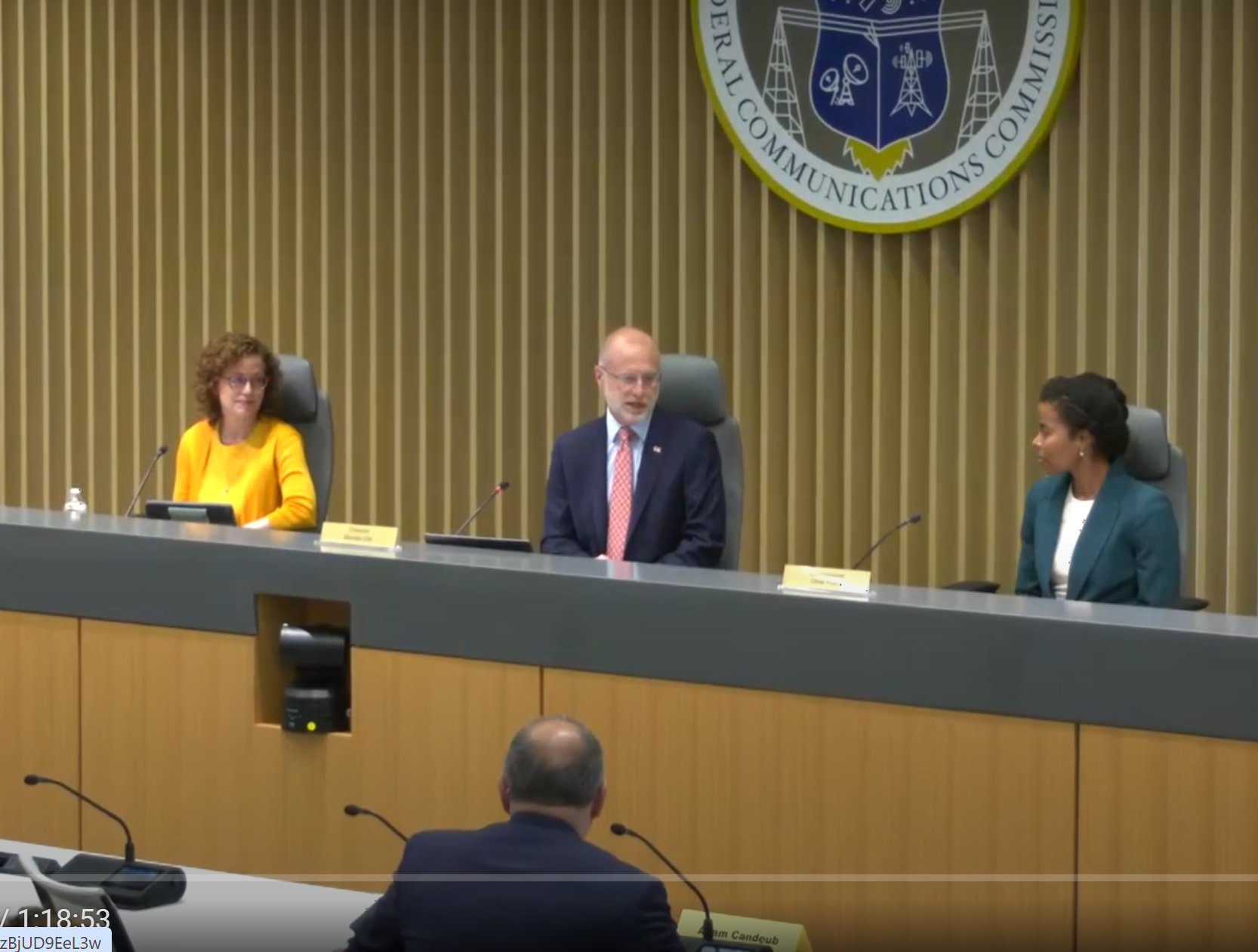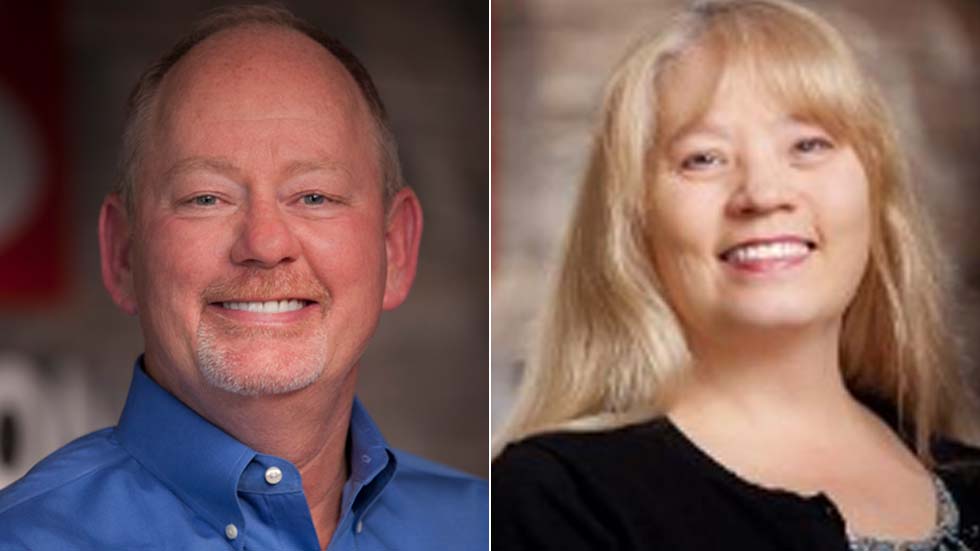FCC Plans Nov. 20 Open Meeting, Provides Shutdown Update
Chair Brendan Carr said the agency will vote on previously developed items, while member Anna Gomez criticized the regulator for forcing votes on items during a shutdown

WASHINGTON—Federal Communications Commission Chair Brendan Carr has called for an end to the government shutdown while providing some updates on the agency’s ongoing work if the shutdown continues through the end of the year.
During his press conference at the end of the October open meeting, Carr said the agency would hold an open meeting on Thursday, No. 20, to vikte on items and issues it had been working on before the shutdown.
[Editor’s note: Detailed coverage of FCC operations impacted by the shutdown can be found here. That article was originally published in our sister publication, Radio World. ]
Carr also said the FCC has been working with about 20% of its staff and said it had enough other items for a December meeting.
Carr did not specify what items it might consider in November or December. Those agendas are typically announced about three weeks before the Open Meeting.
In remarks to reporters, Carr, a Republican appointee, complained about the shutdown, which he called “the Schumer shutdown.”
“I think there's been a dozen votes to try to reopen the government, and we are seeing negative consequences, obviously, already at the FCC, for one, we've got our own national security officials who are…here working without pay,“ he said. ”There's been a lot of our equipment certification work that obviously has had to push pause on as you know, where there's no piece of electronics or communications device that can be sold or used in the U.S. without an approval for the FCC. And so we're starting to see a backlog there of licensing requests. We’re having issues there as well. And obviously the consumer complaint portal itself is also down. So I think it is, you know, past time…to reopen the government fully, and would be again fully staffed at the FCC.”
The professional video industry's #1 source for news, trends and product and tech information. Sign up below.
Carr also noted that about 20% of FCC employees were working. “We have employees that are sort of vital for national security and….additional set issues that are here and working,” he said. “We have exempted employees, which are a very small number of employees that we have back in the building doing significant work for the agency.
“In terms of the ability to pay, there's been an amount of carryover funds that the FCC has had, and also we have a separate appropriation for work on auctions-related spectrum issues,” he continued. “For this [October] meeting [where] obviously, we had nine [items]. We're not going to have nine, unfortunately, at the November meeting. But the nine were obviously, you know, largely baked fully before the shutdown hit, and we had sort of a skeleton crew able to take any…meetings people wanted, be able to respond to edits, obviously, come in and present the items.
“We're trying to be really good stewards of the limited dollars we have all the same time urging the full reopening of the government,” he said, adding: “Our plan is to try to continue to hold [Open] meetings as long as we can. Again, they won't be as full as this meeting because we have fewer staff. We're roughly 20% staffing at this point, and you know, we're gonna try to move ahead with November meeting...But again, the [items for]...November was largely done before the shutdown…I think you're gonna start to see a bit more difficulty going forward” after that.
Carr also reported that pre-shutdown the agency had an equivalent of about 1,300 full-time employees, one of the lowest headcounts in recent years.
“I think we're…below the lowest number of FTEs [full-time employees], at least from the chart that I've seen, in terms of the number of years that it goes back, and we're still churning out a tremendous amount of really good work product, at least before the shutdown.”
During a separate press conference, Commissioner Anna Gomez, the agency’s lone Democrat, criticized Carr for pushing ahead with votes on controversial items during the shutdown.
“You [might] imagine that the work the agency does would slow down while the government is closed, but the opposite happened for this meeting,” she complained. “Instead of focusing on only absolutely necessary items, the FCC voted on a whopping nine items today. This is the most items I have voted on in a single meeting since I became a Commissioner; nine items is a lot of work for a small team to handle at a meeting. But what made the decision to pad the FCC agenda during a government shutdown even more outrageous is that most of my staff is furloughed. My decades of experience in telecom policy helped me to keep up with a wide array of substantive subjects we covered at this month's meeting. But it was [still] like playing volleyball, with one hand tied behind my back. You have to be really good at spiking.”
This also created many problems for the public, she said.
“Stakeholders were affected as well,” she said. “Stakeholders were confused on whether the commissioners were still taking meetings to discuss the items…They didn't know who to reach out to because they knew staff was furloughed. I was even asked if the meeting was still taking place and still open to the public, a logical question, since the government at large is closed.”
“Overloading the agency's agenda during a government shutdown and providing no guidance to stakeholders about how to still reach decision makers is concerning enough,” she concluded. “Even more concerning was the theme that this month's agenda initially displayed based on the drafts initially circulated. This was set up to be the most anti-consumer agenda ever put forth during my time as a commissioner, and that was really troubling. Cloaked by a government shutdown, the FCC was set to propose a slew of anti-consumer measures in the name of deleting regulations.”
Gomez was referring to the fact that the Commission voted 2-1 to revise rules on broadband labels, robocalls and the regulation of prison telecommunications services that she opposed.
George Winslow is the senior content producer for TV Tech. He has written about the television, media and technology industries for nearly 30 years for such publications as Broadcasting & Cable, Multichannel News and TV Tech. Over the years, he has edited a number of magazines, including Multichannel News International and World Screen, and moderated panels at such major industry events as NAB and MIP TV. He has published two books and dozens of encyclopedia articles on such subjects as the media, New York City history and economics.

